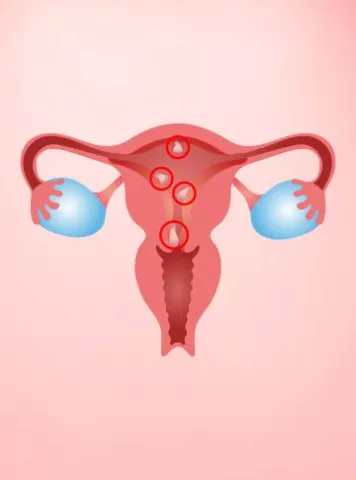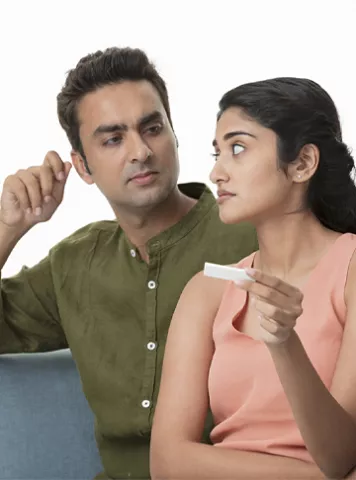Pain during periods is clinically called Dysmenorrhea and found in almost 30% to 90% women worldwide some or the other time during their reproductive life.
Pain during the menstrual periods is the commonest
• Menstrual disorder
• Cause of absenteeism
• Ailment underreported by women.
The monthly periods or menses starts in adolescence and is hallmark of reproductive phase in a women, usually periods being a cause of concern and apprehensive anticipation due to pain as well as various religious, social and cultural connotation. Women undergo several hormonal, physical, mental and physiological changes when the menstruation starts and also during and just before menstruation. Many times it is temporary and may last for one or two months and stops. Many times this pain is associated with various other symptoms like
– nausea and / or vomiting
– hyperacidity and chest pain
– Breast pain and breast heaviness
– Mood Swings and Irritability
– Headache & Bodyache
Dysmenorrhea is also caused by deficiency of certain vitamins like deficiency of Vitamin B Complex, Vitamin E and Vitamin D. Sometimes this pain during menstruation is caused by hormonal imbalances and hormonal insufficiency. Pain during and around menstruation is a topic surrounded by mystery in common women, and it is purpose of this article to dispel some of the mystery surrounding it. Lets answer some common questions relating to this topic:-
1) Is pain during periods really normal?
Two types of Dysmenorrhea :-
i) Primary Dysmenorrhea is defined as dysmenorrhea without underlying cause, usually described as throbbing or cramping in lower abdomen, sometimes radiating to lower back or legs. Milder form of primary dysmenorrhea is normal and requires minimal intervention.
ii) Secondary Dysmenorrhea – when dysmenorrhea is associated with an underlying cause i.e. a physiological or anatomical abnormality which can be demonstrated by investigation, it is called secondary Dysmenorrhea. Secondary Dysmenorrhea needs through investigation and intervention by a qualified physician or gynecologist.
2) Why there is pain in primary Dysmenorrhea?
Pain is caused by increase in prostaglandins, i.e. chemicals secreted by cells of endometrium (innermost living of uterus) which helps in conclusion of menstrual fluid. Primary Dysmenorrhea usually lessens with age or child bearing. Primary dysmenorrhea can be associated with vitamin deficiency and hormonal imbalances. It can also be familial.
3) What are the causes of secondary Dysmenorrhea ?
i) Uterine fibroids
ii) Adenomyosis Common causes of secondary Dysmenorrhea
iii) Endometriosis
iv) Uterine Malformations or abnormalities
v) Pelvic inflammatory disease
vi) Interstitial cystitis
vii) Chronic pelvic pain
viii) Rare – Cervical stenosis
ix) Rare – Ectopic pregnancy
4) What are the treatments that can be taken at home in case of milder form of Dysmenorrhea?
i) Massaging abdomen or at site of pain
ii) Warm bath
iii) Use of local heating pads on lower abdomen or the lower back
iv) Regular physical exercise
v) Light and nutrition’s meals
vi) Practicing yoga and relaxation techniques
vii) Taking simple medication like pain killers (mefanamic acid or drotaverine) and vitamins (Vitamin E, Vitamin Bcomplex).
Any pain not getting better with these above treatment require gynecologist advise and treatment. Many times women tend to take this pain as a normal phenomenon or even as part of natural process and do not take a proper advise neither seek any medical consultation. Gynaecologist will use various medical modalities to treat dysmenorrhea depending its cause and its type. Rarely surgical intervention like laparoscopy is required in extreme cases.
Various tests which might be needed in a female with dysmenorrhea are Sonography of Abdomen & Pelvis, Urine Routine & microscopy test, Haemogram, Hormonal tests etc.
Conclusion: It is important to be aware that Dysmenorrhea is a common condition, which if severe and persistent, requires proper medical attention. Proper scientific treatment can take care of all forms of Dysmenorrhea.
Articles
2023


World AIDS Vaccine Day 2023: Can HIV & AIDS affect fertility or your infant’s health?
World AIDS Vaccine Day is observed every year on the 18th of May to create awa...
2023


Male Infertility Infertility Tips
Hyperspermia: Causes, Symptoms, Diagnosis & Treatment
What is Hyperspermia? Hyperspermia is a condition where an individual produ...


Guide to infertility treatments Infertility Tips
पीआईडी: पेल्विक इनफ्लैमेटरी डिजीज और निःसंतानता
पीआईडी - पेल्विक इनफ्लैमेटरी �...
2022


Infertility Tips Uterine Fibroids
Endometrial Polyps (Uterine Polyps)
What are Endometrial Polyps (Uterine Polyps)? Endometrial polyps, often ref...
2022


Female Infertility Infertility Tips
Why do You Need Fertility Treatment
As we all know infertility rate is constantly rising in our society day by day...
2022


Cesarean Section Vs Natural Birth
Surrogacy centers in Delhi and Infertility centers in Pune state that there ar...
2022


ನಿಮಗೆ ಹುಟ್ಟಲಿರುವ ಮಗುವನ್ನು ಅರ್ಥಮಾಡಿಕೊಳ್ಳುವುದು: ಗರ್ಭದಲ್ಲಿ ಮಗು ಹೇಗೆ ಬೆಳೆಯುತ್ತದೆ!
ವೀರ್ಯವು ಮೊಟ್ಟೆಯನ್ನು ಭೇಟಿಮಾಡ�...
2022


Diet Chart for Pregnant Women: The Right Food for Moms-To-Be
Pregnancy Food Chart 1. The daily diet must include the right amount of pro...
2022


Can i become pregnant while my tubes are tied?
Pregnancy is one of the most important phases in women’s life and is conside...
Pregnancy Calculator Tools for Confident and Stress-Free Pregnancy Planning
Get quick understanding of your fertility cycle and accordingly make a schedule to track it















